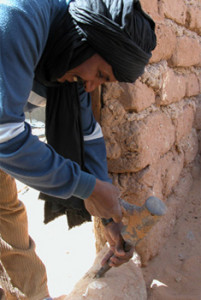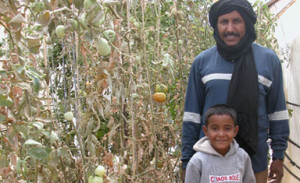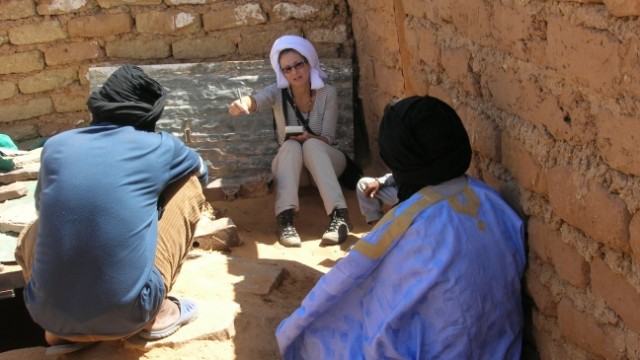A Sahrawi refugee tells how he has succeeded in “cultivating” the desert.
DAKHLA (TINDOUF) – “The well? I dug it by hand. It took me two long months of hard work with a hammer and a metal spike”. Mohammad Abdallahi Elouali is very proud to show us his garden with its tomatoes, onions, peppers and a few melons. A real vegetable garden in the middle of the desert!

he dug the well
Photo : EC/ECHO/Daniela Cavini
I started to work the soil about a year ago. It was vital, as our food is very poor in vitamins and I had no money to buy fruit and vegetables. My idea was to eat what we needed and to sell the rest to earn a little money. Digging the well was the most difficult part, as I had to break the rock piece by piece”.
Mohammed, 45, has six children who all go to school. He has lived in the desert for 31 years. He has returned to his village only once during that time – a visit which lasted only five days. Since 1976, Algeria has accommodated the Sahrawi refugees who are installed in the region of Tindouf, in the heart of the desert. The climate is arid and the temperatures are extreme. Access to basic services – shelter, healthcare, water, education – is extremely limited, which means that life is very hard. Yet this population in exile has progressively organised itself. Today, they are split up into four refugee camps: Smara, Layoun, Ausserd and Dakhla. The latter is the camp which lies the furthest from Tindouf (at 160 km, with 60 km of track) and 800 km from the nearest city. In Dahkla, contrary to the other camps, access to water is less problematic.

Photo : EC/ECHO/Daniela Cavini
“Here” says Mohammed, “the soil is quite fertile under the sand. I can draw water and irrigate my garden. Put a motor-pump on my well? Even if someone could bring me one from abroad, nobody here could make repairs if it broke down. There are no spare parts, and no-one qualified to do repair work. Besides, we have very little electricity here…”.
Despite a relative improvement in their living conditions, the needs of the Sahrawi refugees are still significant. Their survival depends almost entirely on international humanitarian aid. Since 1993, the principal donor for these refugees has been the European Commission; it has contributed more than EUR 133 million in aid, with EUR 10 million being allocated in 2007. The European Commission Humanitarian Aid department (ECHO) finances projects providing basic necessities for the refugees: food, access to water, healthcare, primary education, housing, etc.
Mohammed explains “I am given the seeds. I think they can be bought in Tindouf, but they are very expensive. As it is so hot here, especially in the summer, it’s difficult to cultivate the land. But as the soil is good, the plants grow within 2 weeks in the Sahara. That doesn’t happen much in other parts of the world!” According to their ancestral traditions, the Sahrawians are usually nomads or shepherds; and are not skilled in agricultural. But life in the desert has forced the development of a new “savoir-faire”, and the results are already in evidence.
“My real problem is my family! They are so pleased to see the vegetables growing in the middle of nothing, that they pick them and bring them home when they are barely ripe. This unruly harvesting really doesn’t help me to sell my produce. Over the past year I have sold only 15 kg of tomatoes. But how can I stop my family from taking advantage of this undreamed-of food source? How can I deny them the pleasure of picking a fresh tomato and tasting it straight away?”
Daniela Cavini
ECHO Regional Information Officer – Amman

